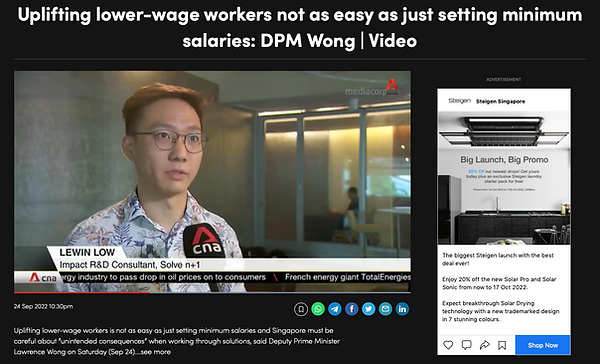
CO-CREATING REST AREAS FOR LOWER WAGE WORKERS
"How might we co-create with stakeholders to ensure sustainable rest areas for lower wage workers?"
Background
Solve n+1 was invited in Feb 2021 to be part of the Ministry of Manpower's (MOM) Alliance for Action for Lower Wage Workers (AfA for LWWs) due to our work with vulnerable communities.
The AfA for LWWs is organised to gather partners from different sectors to ideate on different challenge statements facing LWWs including:
1. Wages
2. Work environments
3. Dignity
4. Training
Solve participated in the first iteration of the AfA for LWWs, sending two representatives, Lewin (Project Consultant) and Tian Wei (Intern).
The Problem

We observed that spaces for building cleaners to rest and take breaks in shopping malls are currently inadequate or simply non-existent.
Having rest areas for these workers to rest during their designated breaks is beneficial to their mental and physical well-being. A supportive work environment for LWWs can result in higher workplace satisfaction and lower turnover rates for companies.
There were two key objectives in this project:
a) To identify key components that make a rest area sustainable; and
b) To provide guidance for property developers keen on establishing sustainable rest areas in their premises.

To understand the needs of the LWWs, the team conducted site visits and interviewed key stakeholders such as LWWs, service providers, and property developers to identify key attributes of a sustainable rest area. Based on the team’s research, recommendations for sustainable rest areas were made.
To ensure that these recommendations were feasible, the team engaged in a pilot project with CapitaLand and Frasers Properties. The results of the pilot validated the team’s model of enhanced rest areas for lower wage workers.
To date, rest areas have been implemented in two shopping malls, a commercial building, and counting.
The knowledge acquired from the team’s research and implementation process has been documented in a guidebook, which can be utilised by other property developers to co-create a sustainable rest area for LWWs.
"This is not just an infrastructure project to build physical rest areas. Rather, this is a people project that first focused on understanding the needs of various stakeholders including property developers, service vendors, and lower-wage workers.
This approach facilitated the mutual understanding and respect of the various stakeholders, enabling them to tell their stories and share their concerns with each other. More importantly, it provided everyone with a platform to contribute something they deemed valuable: building owners provided a suitable space to develop a rest area, service vendors contributed equipment, and essential workers asserted ownership and responsibility for managing the space.
The result? Sustainability in the use and management of the rest areas where everyone is equally invested."
- Lewin Low, Project Lead


